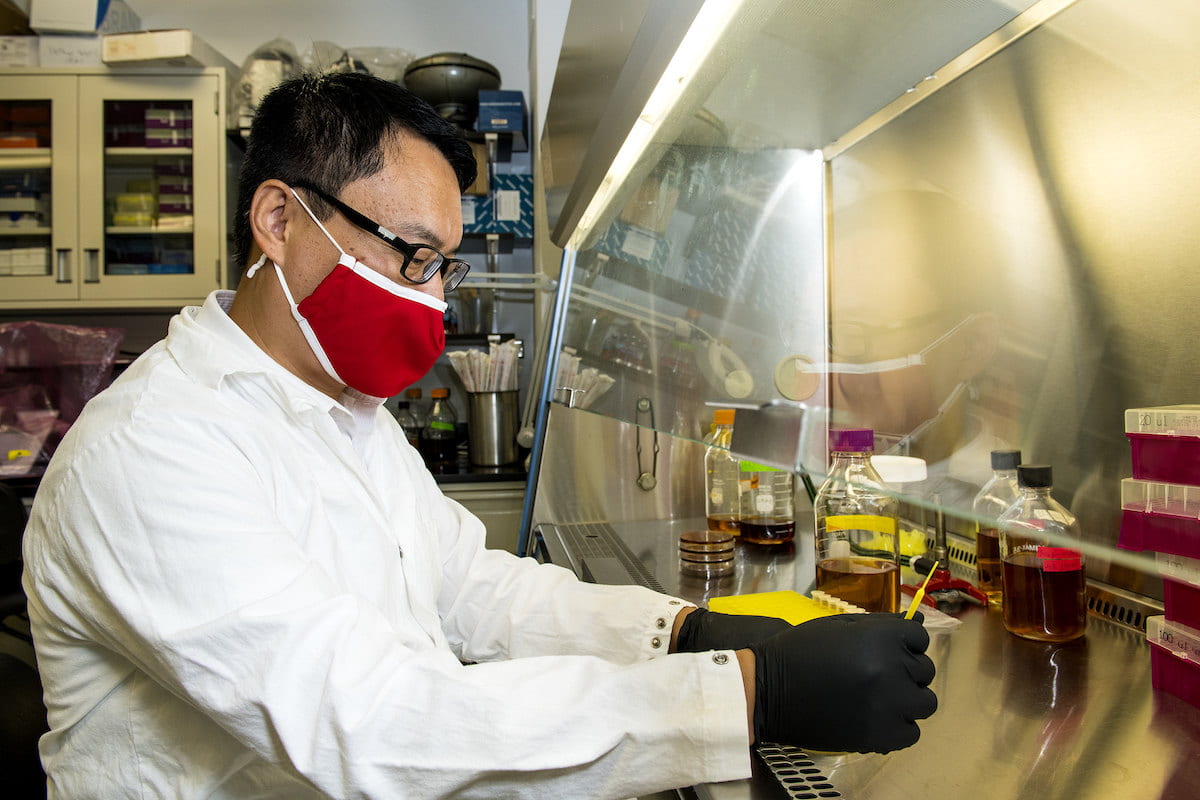Animal Scientists Pioneer New Methods for Culturing Swine Gut Microbiomes

The Problem
The gut microbiome is an environment of microbial communities living in the intestinal tract of animals, including humans and agricultural animals like swine. Microbiomehealth, including the presence or absence of and interactions between beneficial bacterial and illness-causing bacteria, can have a big impact on the health and productivity of pigs.
The swine gut microbiome has been the subjects of many studies because pigs serve as excellent biomedical models for human diseases and also because they are an important source of protein for human diets. But little was known about how to culture the swine gut microbiota, an important part of understanding the role of the microbiome in swine production.
The Work
Arkansas Agricultural Experiment Station scientist Jingchao Zhao and post-doctoral researcher Xiaofan Wang began a comprehensive investigation of the swine gut microbiome aimed at improving the animals’ health. Zhao’s research team in the department of animal science collected fecal samples from pigs at the experiment station’s Swine Research and Teaching Center and subjected them to next generation DNA sequencing. Also known as high throughput sequencing, this scientific method allows researchers to quickly sequence DNA for thousands to millions of samples.
The investigation resulted in a highly detailed description of the bacterial environment of swine guts, and Zhao’s team discovered that there are many more bacteria in the swine gut microbiome than previously known, including previously undetected bacteria. They also identified many core bacterial species that are essential for swine health from birth and throughout the animals’ lives.
The next step was to figure out which bacteria provided health benefits and which were potentially disease-causing. The individual species of microbiota had to be separated and multiplied, then fed back to the pigs to see which had benefits and which might make them sick. Their goal was to correlate specific bacteria to feed efficiency —or how well pigs turn food into muscle. And there was no roadmap for that.
To accomplish this, Zhao’s research team had to develop new methodologies for isolating individual bacteria and culturing them. The researchers employed 53 bacterial cultivation methods using different combinations of growth media and gases. Their subjects were three pigs from four different growth stages.
The Results
The work resulted in successful culturing techniques that gave them sometimes surprising results. They found more previously undetected bacteria, even beyond the new species found using next generation sequencing. Their published paper on culturing has become a guidebook that can help other researchers conduct swine microbiome culture research. Also, numerous companies, research institutions and scientific organizations have invited Zhao to speak about his research and its results.
The Value
Three of the bacteria strains isolated in Zhao’s research and fed back to pigs were found to significantly improve pig health and feed efficiency. Those strains were cultured to expand the amount of each bacterium. These were then used to develop three probiotic products, live bacteria that are beneficial to their host animals. Probiotics can reduce reliance on antibiotics to protect animal health.
The University of Arkansas System Division of Agriculture patented Zhao’s process for making them. The products were subsequently licensed to an animal nutrition company that will market them globally.
Funding
University of Arkansas System Division of Agriculture, Arkansas Agricultural Experiment Station and partially supported by a USDA NIFA grant (2018-67015-27479).
About the Researcher

Jiangchao Zhao
Associate Professor of Animal Science
University of Arkansas System Division of Agriculture
- B.S., plant pathology, China Agricultural University, Beijing
- M.S., plant pathology, China Agricultural University, Beijing
- Ph.D., environmental microbiology, University of Wisconsin-Madison
Zhao’s research focuses on human and animal microbiomes utilizing the scientific techniques of multi-omics, big data and cultureomics. His work leads to understanding microbiome-diet-host interactions and development of probiotic, prebiotic and postbiotic products. His investigations have included the swine gut microbiome, the biogeography, inter-animal variation and dynamics of the bovine upper respiratory microbiome, and the correlation between human gut microbiota and longevity.

